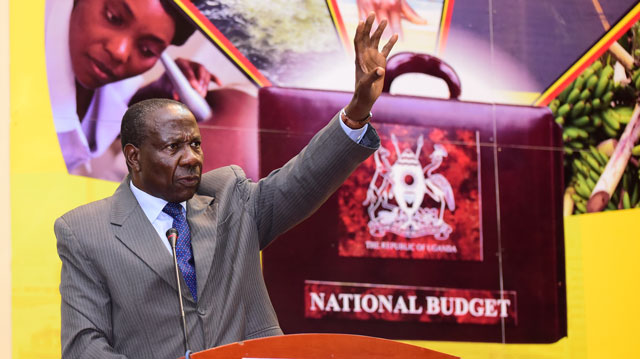
Debate about effective budget implementation has continued since June 08 when Finance Minister Matia Kasaija read the budget speech at Kampala Serena Conference Centre.
Kasaija, who presented his budget for the third time, hinted on corruption and laziness amongst civil servants as one of the main obstacles that would interfere with smooth implementation of the new budget.
Effective implementation of the budget ideally means good spending of available resources in line with priorities set and in accordance with the law.
Once achieved, it (effective implementation) would guarantee value for money to tax payers and other funders of the budget. It would also mean improved welfare of citizens as per the budget strategy.
“Their days are numbered,” Kasaija said on June 12 while responding to a question from one journalist on the sidelines of a budget breakfast meeting organised by the Institute of Certified Public Accountants of Uganda (ICPAU) at Imperial Royale hotel in Kampala.
While reading the budget, Kasaija apologised to the public for having two of his officials in the ministry involved in a bribery scandal involving one investor.
He said that for the new budget, government would fight corruption vices using the amended the leadership code to permit confiscation of properties acquired through corruption.
“In order to eliminate corruption in public offices, the inspectorate of government has established a directorate to specifically handle high profile corruption cases which require highly specialised knowledge, skills and tools to investigate,” Kasaija’s budget speech reads in part, adding, “This will mainly focus on high profile and syndicated corruption cases in the transport and infrastructure, education, health, and agriculture sectors.”
For this to be enforced, Kasaija said the leadership code has been strengthened with the adoption of the online wealth declaration system to ease the processing of declaration and analysis.
Kasaija also said that effective budget implementation would require all members of the public to roll up their sleeves.
“This is our country; let us not look like as if we are mercenaries; nobody will come to develop us except ourselves,” Kasaija said at another forum on June 12.
He added that for Uganda to attain the middle income status (where per capita income would jump from the current US$773 to US$1,039 by 2020), they (governemnt) have set themselves, business cannot be as usual; mind-sets and attitudes of all Ugandans must change towards hard work and not wait for handouts.
He added that all able-bodied Ugandans must engage in productive economic activities.
A section of experts say for the budget implementation process to yield results, government must serve as an example for the rest to take part.
Ramathan Ggoobi, a senior lecturer at Makerere University Business School (MUBS) agreed with Kasaija in speech but accused him of using ‘normative’ language instead of ‘positive’ language in search for answers regarding budget implementation.
“If those in charge like a minister of finance says we should do this and that, without showing what government has done or how they intend to do it, then there is a problem,” Ggoobi, who was a panelist at the ICPAU meeting said.
He said government needs to walk the talk when it comes to budget implementation.
Kasaija said his office and those of his junior ministers are open to the public wanting service on any issues regarding budget implementation and other service delivery related issues.
Other avenues of implementing this budget include; the budget information website that gives updates on funded programmes for the public to share any feedback regarding their implementation in any part of the country. The ministry has also established a hotline for suppliers to report delays in payments of approved and verified bills.
This is in line with the historical problem regarding domestic arrears accumulation which has negatively impacted the private sector yearning for cash to go about their businesses. In the new budget, Kasaija allocated Shs 300 billion to settle domestic arrears, which he said would be released in the first quarter of the new financial year.
The new budget carries the theme; `Industrialisation for job creation and shared prosperity’ which is linked to the country’s second national development plan aimed at ushering in middle income status by 2020.
Of the Shs 29 trillion budget; the biggest in Uganda’s history, about Shs11.3 trillion will be spent on development in the next financial year.
The rest of the money; Shs3.5 trillion is for salaries and wages, Shs 8.3trillion is the cost of running government termed as non-wage expenditure, Shs4.99 trillion as domestic debt refinancing, and Shs757 billion is appropriation in aid or money collected and spent by departments.
In terms of real sector allocations, four out of 18 sectors of the budget are consuming 55% of the budget with works and transport taking the largest share of Shs 4.5 trillion (20.8%) up from 3.8 trillion a year before followed by interest payment due which snatched Shs2.6 trillion (12.2%) up from Shs2 trillion in FY 2016/17, then education taking Shs 2.5 trillion up from 2.4 trillion a year before and energy and mineral development getting Shs2.3 trillion almost the same amount allocated to it in this ending financial year. The other sectors including health, security and agriculture and others took the small balance with each of them getting below 10% of the entire budget.
The new budget actual implementation official date is July 1, 2017.
 The Independent Uganda: You get the Truth we Pay the Price
The Independent Uganda: You get the Truth we Pay the Price


